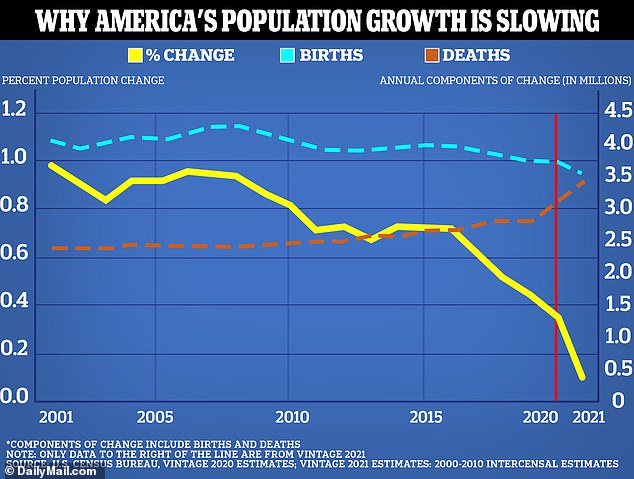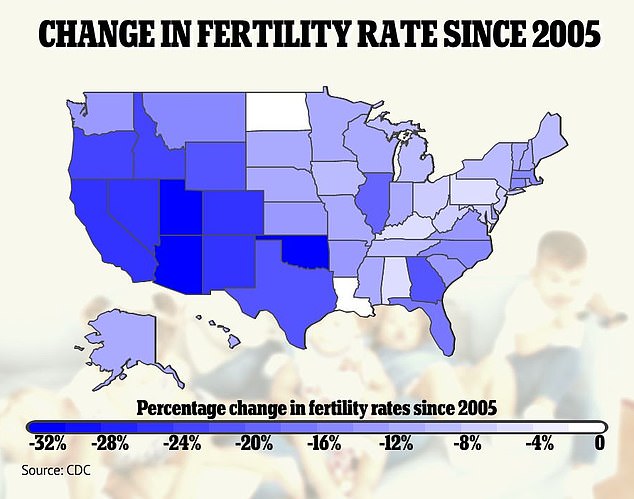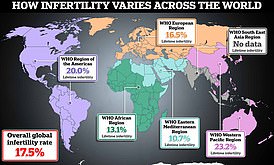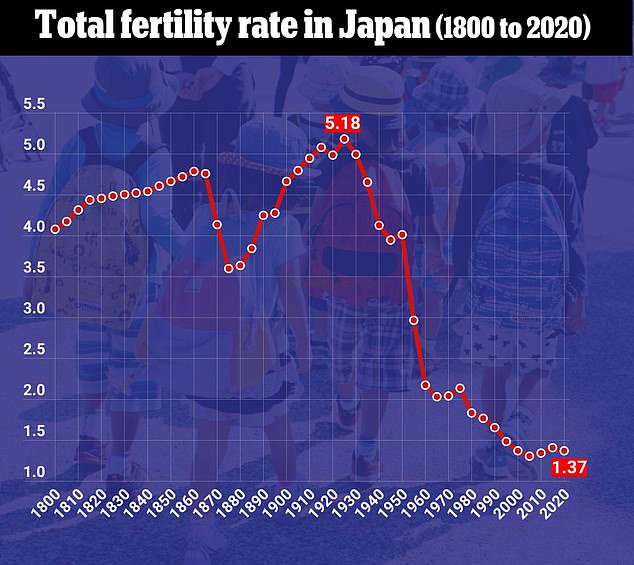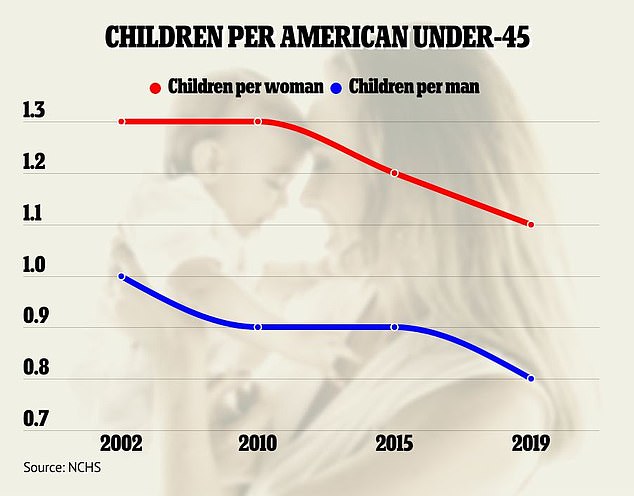They put the word “virgins” in all caps, which shows you how serious and odd the situation is.
@cvh1991
Here is the full article that was posted on Dailymail.com today:
Doctors warn US is barreling towards same fertility crisis as Japan - where one in 10 men in their 30s are VIRGINS and third of women will be childless
By: Caitlin Tilley, Health Reporter For Dailymail.com
Published: September 1, 2023
Claims that the world is becoming 'overpopulated' have been in the zeitgeist for decades, but it's a lack of new babies that really concerns experts in developed countries.
Japan announced this week that as many as a third of 18-year-old women may never have children due to a 'sex recession' that has plagued the country for decades.
One out of every 10 Japanese men in their 30s is still a virgin, and the country's fertility rate has plummeted from 1.5 in 1992 to 1.34 births per woman in 2020.
The lack of babies being born is already having real-world impacts — Japan's economy has stalled and caused the country to lose its place as an economic superpower.
And experts warn the US is barreling towards the same fate, with fertility rates at a historic low and an increase in sexless relationships.
Over time in the US, births have decreased while deaths have increased, leading to a decline in population
Fertility rates have dropped the most since 2005 in Utah, Arizona, Colorado, Nevada and California
As well as having one of the lowest birth rates in the world, Japan also has one of the highest life expectancies, meaning it is left with a rapidly aging society, a shrinking workforce and fewer taxpayers.
Experts told DailyMail.com that America could be in store for a host of problems, such as a slump in economic growth and difficulties for retirement systems, if the birth rate does not pick up.
A baby boom in the mid-20th century saw the average woman in the US give birth to between three and four children. Today, that rate is just 1.6 — the
lowest level recorded since data was first tracked in 1800.
And there is 'nothing in the data to suggest this trend is going to reverse itself anytime soon,' Dr Phillip Levine, a professor of economics at Wellesley College in Massachusetts, told DailyMail.com.
The UN agency said the sheer scale of the crisis underscored the need to widen access to costly fertility treatments.
He added that financial incentives — such as those promised in Japan for families with three or more children — are 'unsuccessful' at significantly raising a country's birth rate, and we may have to 'learn to live in a world in which the birth rate is low.'
In January 2023, Japan increased its financial incentives and offered 1m yen ($7,500) per child to families who moved out of greater Tokyo.
It topped an existing relocation fee of 300,000 yen ($2,000). It is too early to tell if it will make a lasting difference, but experts are not optimistic.
Dr Levine told DailyMail.com there will need to be economic reorganization to keep the country afloat, adding 'jobs will be lost' in manufacturing, construction and other fields and move into care and other services for the elderly.
This will 'eventually have a damaging impact both on social cohesion and general wellbeing, and on economic dynamism', he warned.
Dr Christopher Murray, a global health expert from the University of Washington, told DailyMail.com: 'Since most purchases of real estate or consumer durables are in the working age adults, it will tend to put downward pressure on these types of assets.
'In the long run, societies have to adapt to having more grandparents than grandchildren.
'We are actually only just beginning to understand the myriad [of] challenges that sustained low fertility will have on societies.'
Previous research has revealed Americans are having far less sex than former generations.
A
study from 2017 found that married or live-in couples had sex 16 fewer times per year in 2010-2014 compared to 2000-2004.
And couples had nine times more sex in 1995-1999 than they do now.
Experts have many theories as to why our interest in sex is dwindling - including porn addiction, lipido-sapping drugs like antidepressants, low testosterone levels among men, obesity and other factors.
Dr Stuart Fischer, an internal medicine physician in New York, told DailyMail.com that there needs to be a public mind shift where Americans start thinking about sex as a productive activity for the greater good and have more 'goal-directed' sex to increase the birth rate.
Japan announced this week that as many as a third of 18-year-old women may never have children due to a 'sex
recession' that has plagued the country for decades
The average American woman under 45 has 1.1 children, while the average man has 0.8, the National Center for Health Statistics reports
In Japan, the falling birth rate has been attributed to a waning appetite for marriage and parenting and growing financial worries, leaving couples questioning whether they can afford children.
It is also due to a vicious cycle of fewer children who then have fewer children, said Takuya Hoshino, senior economist at Dai-ichi Life Research Institute.
As people have less children, they are able to spend more on each child than families have in the past. That drives up the average cost of raising a child for the broader population, putting some people off from having children, he said.
In the US, similar problems are blamed, as well as women prioritizing careers and the rise of fertility treatments, leaving many to think they can wait.
But Dr Levine said the evidence for these theories 'isn't really that great' and admitted that researchers don't have a 'firm grasp' on why American women are having fewer children.
'States where housing costs are rising more or childcare costs are rising more don't have birth rates that are falling more rapidly than other states,' he said.
For example, Massachusetts has the most expensive childcare but has the fourth lowest fertility rate out of the states.
'It doesn't seem like it's about the finances; it seems like it's about what people want out of their lives.'
He said: 'The Great Recession definitely started the ball rolling in the US and births are routinely linked to economic activity.
'But when the recession ended, births didn't rebound, they just kept going down. So that clearly played a role at the beginning, but not an ongoing role because the recession did end.'
Instead, Dr Levine thinks the falling birth rate is likely due to 'changing preferences, life goals and aspirations' among women and their partners.
'Marriage and childbearing may not be quite as much of a priority among more recent waves as young people, as they have been in the past,' he said, but added that this is not 'country-specific.'
An erosion of family values and religious principles might also be a factor, Dr Fischer said.
In Japan, the number of children has been falling for more than four decades, which is having a disastrous effect on GDP and productivity.
Japan's population of 126.15 million in 2020 is projected to fall to 87 million by 2070, according to the National Institute of Population and Social Security Research.
In Japan, the falling birth rate has been attributed to a waning appetite for marriage and parenting and growing financial worries, leaving couples questioning whether they can afford children
In China, the infamous one-child policy had catastrophic effects. Described as the worst policy in history, it caused China's fertility rate to crash by more than half, from 5.8 births per woman in 1970 to 2.7 births per woman in 1979.
And the effects are still being felt. Government data estimates showed China's fertility rate dropped to a record low of 1.09 in 2022 — the lowest of any country with a population over 100 million.
A falling birth rate is detrimental to a country for several reasons. Fewer births means fewer workers, which has 'implications for economic activity and economic growth,' Dr Levine said.
'It causes problems for retirement systems that are based on current workers paying benefits for current retirees,' he said, as well as difficulties 'funding and managing a school system.'
Dr Fischer agreed that the reasons for America's falling birth rate are sociological.
'People are more anxious than ever,' he said. 'People are in more desperate conditions; the economy is obviously very, very unstable. This is not the situation that would have occurred after winning a World War, let's say, where you're happy and you want to start a family. This is the antithesis of that.'
The rising cost of living has been a deterrent for people to start a family, Dr Fischer said.
He also noted how dating has changed over the years. 'In the old days, that would be arranged marriages,' he said.
Dr Fischer said the pandemic, technological advances, and increasing use of the internet have caused people to become 'more insular.'
'It's easier to become isolated from society on the internet... and you don't really want to go out because you're depressed,' he said, pointing to America's growing mental health crisis, with
one in five adults currently clinically depressed.
He added that rising obesity rates could be having an impact on fertility for both men and women.
'When you have obese men, the balance of testosterone and estrogen isn't correct, so there can be fertility problems,' he said.

